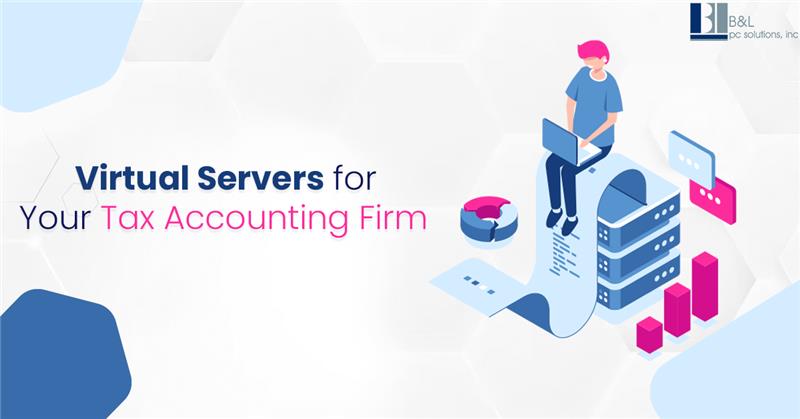
Modern society highlights the importance of utilizing technology, secure systems, and safe working environments, especially when handling client information and the heavy workloads of tax accounting firms. This technology is revolutionizing how these firms manage their IT resources. Both small tax practices and large firms can benefit from virtualization because it will reduce expenses, increase productivity, and protect data.
This blog post will give you an overview of what virtual servers for tax accounting firms are, and how they can transform the approach of tax accounting firms.
What is a Virtual Server?
A virtual server is a complete server setting that functions as a physical server but runs on a more extensive physical host. Virtualization means that many virtual servers can be under one physical server, and every virtual server is an operating system replica.
Unlike the old-school server, a virtual server can handle various tasks without specific hardware. Groupings allow computers to work in a cluster to access a single CPU, memory, or storage, making them more effective and affordable.
Tax accounting firms don't need to have different physical servers to accommodate multiple applications, such as tax software and file storage.
What Is the Working of a Virtual Server All About?
A virtual server is developed by utilizing software known as a hypervisor. The hypervisor splits the physical server into virtual settings, creating independent digital worlds. Each virtual operating server has copies of operating systems with applications that may be accessed and controlled via isolated channel connections.
Here's a simple example: Suppose there is a hotel. Each room functions like a server; it is an individual, spatial, functional, and private entity while also being part of the overall structure. Similarly, a virtual server is configured with the help of another physical server but works autonomously.
It allows business organizations to manage themselves effectively without spending much on specialized hardware or physical infrastructure.
Advantages of a Virtual Server for a Tax Accounting Firm
A virtual server is a cost-effective and scalable model that can improve a business's processes. It effectively manages resources consecutively by buying and selling hardware while providing different environments for various tasks. The easy scalability of virtual servers can add more capability to growing businesses without requiring more hardware. It also provides additional security and data protection to protect any information. In broad terms, virtual servers enable increasing organizational efficiency, cutting costs, and maintaining levels of server functionality. Let's see how.
-
Cost Savings
Central servers are expensive to buy and maintain compared to Virtual servers. Tax accounting firms can avoid spending significant funds on this system by allocating their budgets to more critical areas like client services.
-
Scalability
When businesses experience a heavier load during the tax filing season, virtual servers can grow to handle much more work if necessary. After the season passes, you can reduce it to pay only the amount that you have consumed.
-
Data Security
Virtual servers already have basic data protection features, such as encryption and firewalls, which ensure the client's data security against cyber risks.
-
Accessibility
Due to cloud hosting, tax professionals can work in association from any location, using data and applications at their convenience.
-
Compliance
Virtual servers are helpful when it is necessary to meet the commercial requirements of specific industry requirements on how their data should be stored safely and organized.
Read More Blog : Virtual Desktops: Benefits, Drawbacks, Use Cases, and How It Work
What Can Tax Accounting Firms Anticipate from Virtual Servers?
Virtual servers are expected to benefit tax accounting firms by using efficient, affordable, and scalable IT solutions. They provide secure storage platforms and are effective in data backup and recovery to keep a business operational. Companies can also expect applications and client data to be more easily accessed anywhere. Virtual servers generally ease operation and allow firms to direct efforts to essential activities.
By Implementing a Virtual Server, You Can Expect
-
Reliable Performance: This allows firms to manage the servers so that they run efficiently during the most hectic times.
-
Improved Collaboration: Multiple users can be logged on to a single system, enhancing teamwork productivity.
-
Disaster Recovery: When hardware fails, virtual servers enable data recovery and minimize downtime, ensuring the minimum downtime.
-
Software Compatibility: Virtual Servers support almost all tax software, including QuickBooks and TurboTax.
Stakeholders, Real Facts, and Trends of Virtual Server
-
There is a growing demand for server solutions in tax accounting. 80% of accounting firms in the US are considering or have adopted virtual servers.
-
A recent report from Gartner indicated that cross-borne virtualization has risen by 25% within two years in financial services firms.
-
Tax accounting firms use server virtualization to manage their operations and cut costs. Some virtual server applications expose a 30% cut in IT costs and enhanced security among firms applying the technique.
How to Select Virtual Servers for Tax Accounting Firms
When choosing virtual servers for tax accounting firms, some parameters that need to be considered include scalability, security, and compatibility with key tax accounting software solutions. Look for providers who ensure performance, sound and strong client support, and affordable prices depending on your firm's requirements. Focusing on protection and using continuous flow to manage and archive client data reduces vulnerability to external threats.
Selecting the proper server helps to work smoothly and to maintain effectiveness in the long term. When choosing a virtual server, consider these factors:
-
Specifications: Identify your firm's computing capacity and storage capacity requirements.
-
Cost: Expect to come across pricing structures, including per use per month or year.
-
Support: Select a provider that offers proper and efficient managed IT services Long Island for tax firms and customer care services throughout the day.
-
Security Features: Ensure the server benefits from safeguards such as multi layer encryption and automated backup.
Data Protection and Backup Solutions
-
Tax accounting firms have to protect client history through information control.
-
Virtual servers offer data backup, ensuring no data is lost due to user errors or system failures.
-
Two-factor authentication and firewalls put measures in place to prevent breaches.
Conclusion
Virtual servers are essential for tax accounting firms as they provide significant benefits such as affordability, flexibility, and security. As a result, it is advantageous for your firm to adopt server solutions in accounting to manage increased workloads and client demands effectively.
Are you passionate about transforming the structure of your tax accounting firm? At B&L PC Solutions, we can team up to develop a customized IT solution for your tax firm. Contact us Today! We offer free consultations with our experts.
Frequently Asked Questions on Virtual Servers for Your Tax Accounting Firm
What is a virtual server in a tax accounting firm?
A virtual server is a software-based server that simplifies data storage and management for tax accounting firms, eliminating the need for physical servers.
How does a virtual server increase data security?
These include encryption, firewalls, and secure backup solutions for protecting complex financial data.
Is the use of a virtual server cost-effective for small tax firms?
Indeed, it reduces dependency on costly hardware and makes provisions for tariff-based pricing.
Can virtual servers support the most used tax software?
They are entirely compatible with software like QuickBooks and TurboTax.
How do I get started with a virtual server?
Please consult with a managed IT services provider for such services and have them help you get started.
Are you ready to discover the uses of virtual servers for tax accounting firms? Contact B&L PC Solutions to get the right IT solutions for tax accounting firms with a guarantee of satisfying services. Get the best and most secure IT services on Long Island for your Firm Today!
Tags: Advantages of a Virtual Server for a Tax Accounting Firm, Data Protection and Backup Solutions, How to Select Virtual Servers for Tax Accounting Firms, server virtualization, server virtualization on Long Island, Virtual Servers, Virtual Servers for Your Tax Accounting Firm, What is a Virtual Server?, What Is the Working of a Virtual Server All About





